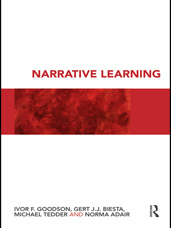Narrative Learning
Towards a Theory of Narrative Learning
Paul Larsen remains an important exception to all this because whilst there is ongoing narration that is clearly focused on the self – and in this regard the quality and content of his narration is similar to that of Christopher, Eva, Russell Jackson and, eventually, Marie Tuck, his case shows that ongoing ‘identity work’ in and through narrative learning is not, in itself, a guarantee for a ‘translation’ into action. As we mentioned before, our cases show that it is more likely that open narration of this kind ‘translates’ into action, but the efficacy of such forms of narrative learning remains without any guarantees.
Maggie Holman’s case provides us with another important reminder about some of the limitations of narrative learning. When we concluded, discussing her case, that there is no real evidence that for Maggie narration functions as a site for learning, we were not trying to suggest that Maggie was not learning, but that she was not using narrative and narration – which we basically depicted as temporal rather than as spatial devices – to learn from her life and the storying of her life. Maggie’s case thus helps us to see that narration is not a natural necessity, but a particular ‘tool’ that some people can use and find useful. But the ‘tool’ itself is not one that everyone has available or that works for everyone. It can work for those with narrative cognition, but Maggie’s case shows that it has limited or no use for those with non-narrative forms of cognition – or, as in Maggie’s case, a form of cognition that we referred to as ‘pictorial.’ The more important question, perhaps, is why nowadays so many people feel relatively comfortable with narrative and narration, with life story and life history. Perhaps the pervasiveness of narrative and narration in modern life is something that should worry us and needs further investigation, rather that it should simply be accepted. Zygmunt Bauman, in his book Liquid Modernity (Bauman, 2000), has argued, for example, that the erosion of the public sphere not only happens through neo-liberal incursions from the side of market, but also through incursions from the private sphere (e.g., through the growth of reality television and other modes of confessional popular culture) that amounts to a celebration of the personal without asking more difficult questions about the processes through which personal issues can be transformed into public issues that have political rather than just personal significance.
